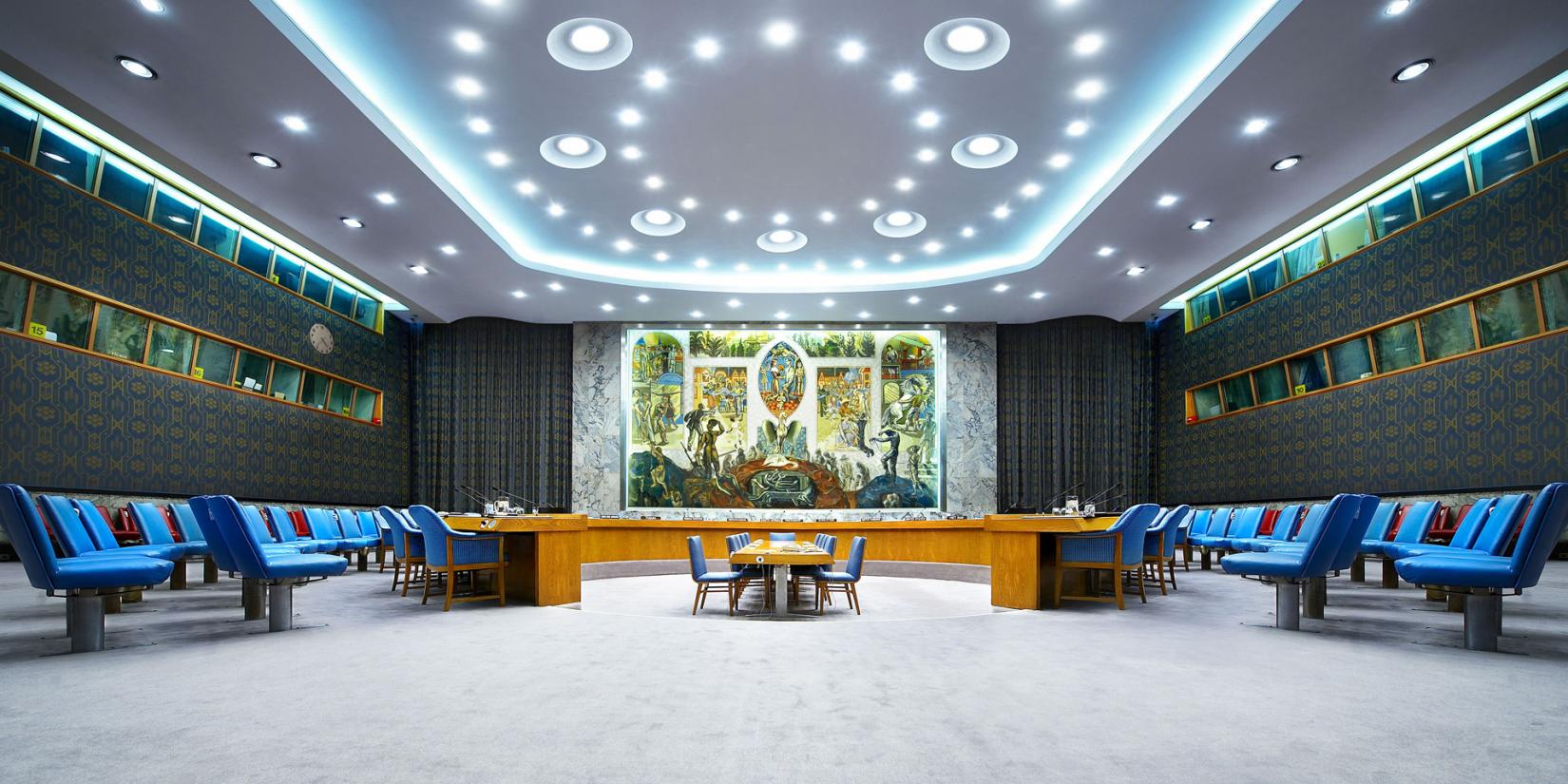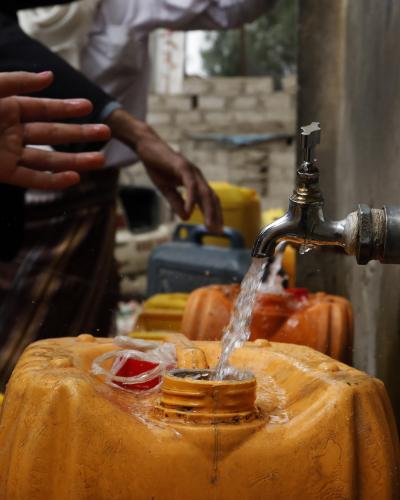In the run-up to Switzerland's election for a non-permanent seat on the UN Security Council for the 2023–24 period, the Federal Council has put forward four thematic priorities: building sustainable peace, protecting civilians in armed conflict, addressing climate security and enhancing the effectiveness of the Security Council. These priorities will be presented to the Parliamentary Foreign Affairs Committees for consultation and adopted definitively after the end of the process. The priorities in brief.
The date of Switzerland's election for a non-permanent seat on the UN Security Council (9 June 2022) is fast approaching. On 25 May 2022, the Federal Council put forward four thematic priorities for Switzerland's term on the Security Council. Switzerland intends to represent its foreign policy values and interests in the Security Council. It seeks to build sustainable peace, protect civilians in armed conflict, address the impacts of climate change on security and improve the Council's effectiveness. By serving on the Council, Switzerland will be able to fulfil its constitutional mandate to work for the long-term preservation of natural resources and a just and peaceful international order to even greater effect. Furthermore, it will be able to search for solutions between conflict parties and create added value for the international community.
Setting priorities does not mean that Switzerland will neglect other issues. In line with its Foreign Policy Strategy 2020–23, Switzerland strives for credible engagement in the Security Council across the full range of its agenda in which means above all its day-to-day business on individual country situations.
Switzerland's thematic priorities in detail.
Building sustainable peace
Switzerland has many years of experience and a strong track record in promoting peace and helping to prevent armed conflicts. As part of its peace policy, Switzerland provides its good offices in conflict situations, including mediation services and protecting power mandates. For example, it supports peaceful electoral processes in countries emerging from conflict. This may involve the drafting of common codes of conduct banning hate speech, religious symbols and excessively confrontational language in election campaigns in order to build trust between political parties, promote democratic compromise and ensure that election results are accepted by all parties.
Switzerland regularly hosts peace conferences and peace negotiations. Switzerland's flexibility, professionalism and discretion are widely acknowledged in UN peace processes and by parties to conflict. For example: at the request of the then UN Secretary-General Ban Ki-moon, since 2013 Switzerland has facilitated a series of peace talks on Syria in Geneva on the basis of a roadmap endorsed in a Security Council resolution. Seven rounds have taken place in Geneva since then, and Switzerland has also facilitated the continuation of the dialogue during the COVID-19 pandemic.
As a member of the Security Council, Switzerland would strive to ensure, among others, that the following issues are addressed:
- Confidence building and continued cooperation among states within the Security Council
- Effective UN peacebuilding
- Respect for human rights
- Women's participation in peace processes and UN peacekeeping missions able to tackle problems in affected countries
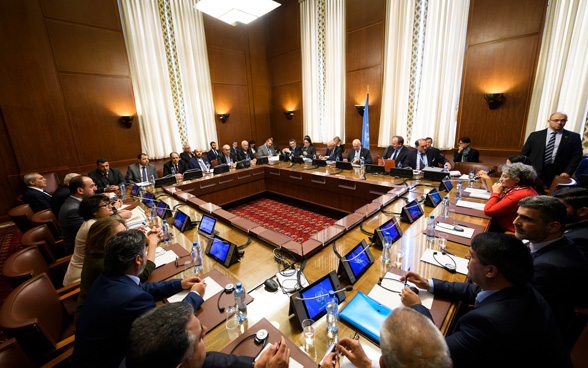
Protecting civilians
The civilian population pays far too high a price in armed conflicts. Switzerland's long-standing humanitarian tradition and commitment to international humanitarian law are recognised worldwide. Protecting civilians and persons no longer taking part in hostilities is at the heart of numerous conflicts worldwide on the agenda of the Security Council.
Switzerland has long been active in this area, playing a leading role in coordinating the positions of a group of like-minded states on the protection of civilians. In the Security Council, Switzerland would strive to ensure, among others, that the following issues are addressed:
- Ensuring strict and more comprehensive compliance with international humanitarian law, in particular in relation to the conduct of war and the protection of civilians
- Special attention to the protection of children, patients, medical staff and facilities, aid shipments and critical infrastructure (water supply or food production) in armed conflicts
- Enhancing the prosecution of violations of international humanitarian law
In response to the war in Ukraine, Switzerland sprang into action to provide emergency humanitarian aid. Because Switzerland has a representation in Moldova, it was one of the first countries to be able to provide humanitarian aid to people in affected cities. Switzerland has also offered its good offices to the parties to the conflict.
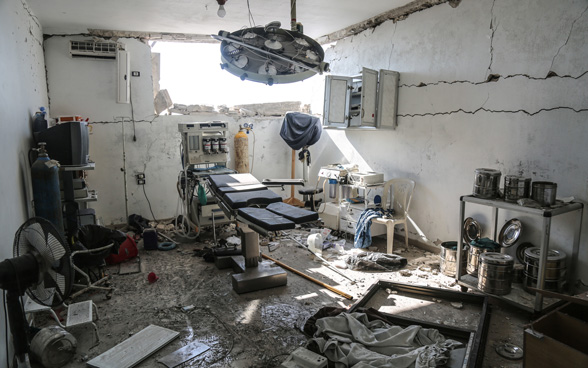
Addressing climate security
Climate change also threatens peace and international security. Rising temperatures or droughts can, for example, cause food price fluctuations and fiercer competition for natural resources, make livelihoods more insecure and displace people. Climate change is a risk multiplier with the potential to exacerbate existing political, social, economic and ecological stress factors. The most vulnerable population groups are usually the most exposed to climate risks. Switzerland also has the expertise and know-how necessary to mitigate climate-related risks in this area.
During its term on the UN Security Council, Switzerland would strive to ensure, among others, the following:
- Address the security and peace policy-relevant impacts of climate change and identify possible solutions.
- Establish links with other key objectives of Swiss foreign policy, such as protecting civilians, reducing the risk of disasters, preventing conflicts and countering violent extremism.
- Find solutions, drawing on the expertise of the Federal Administration as well as that of the scientific community, civil society and International Geneva in particular.
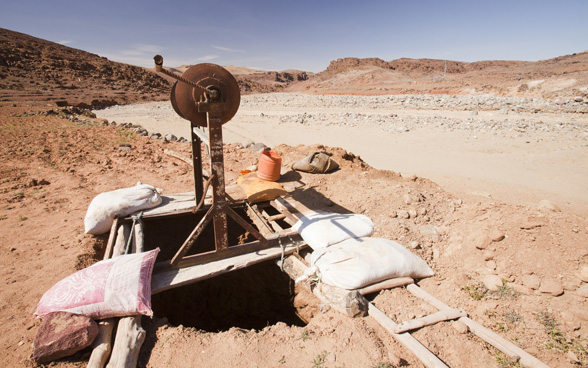
Enhancing effectiveness
Since 2006, Switzerland has been advocating for greater transparency and accountability and the inclusion of non-members in the work of the Security Council. It coordinates the activities of the Accountability, Coherence and Transparency (ACT) group of 27 countries. It supports, among others, the responsible use of the veto by permanent members of the Security Council. A code of conduct drawn up by the ACT group calls on all Council members not to vote against a credible draft resolution that seeks to prevent mass atrocities. Over 120 countries around the world have already committed to this code.
During its term, Switzerland would strive to ensure, among others, the following:
- Improve sanctions regimes' compliance with rule of law principles
- Promote closer linkages between the work carried out in different UN locations, including Geneva
- Improve the Security Council's processes, capacity to act and accountability
Logical extension of current Swiss commitment
Switzerland's non-permanent seat on the UN Security Council will be a logical extension of its commitment to peace and security worldwide. The Federal Council submitted Switzerland's candidature in 2011 following extensive consultations with Parliament. The Federal Constitution states that Switzerland shall promote the peaceful coexistence of peoples and help to build a just international order. This is also the declared goal of the UN Security Council. It is also vitally important for a country that is as integrated into global economy and as dependent on stability and clear international rules as Switzerland is. Peace and stability are essential for prosperity and development.
Next steps
The Foreign Affairs Committee will now be consulted on the priorities put forward by the Federal Council. This is in line with the wishes of the FACs and is specified in the Federal Council's report on Switzerland's candidature for a non-permanent seat on the United Nations Security Council and the involvement of Parliament, dated 11 September 2020. The consultation with the FACs is expected to continue throughout the summer. At the end of the process, the Federal Council will permanently adopt the priorities.
UN Security Council and Switzerland's neutrality
Neutrality is an advantage for a state serving on the UN Security Council. It lends a neutral state the credibility to mediate between parties to a conflict. The Security Council's mandate is to maintain peace and security on behalf of the international community. As a member of the Security Council, Switzerland would contribute to the UN's system of collective security. Neutral states, such as Austria or currently Ireland, regularly serve on the Security Council. A Federal Council report published in 2015 concluded that Switzerland would retain its ability to fully exercise its neutrality while serving on the Security Council.

